David Corenswet takes Greg Williams back to school as Superman takes off.
David Corenswet takes Greg Williams back to school as Superman takes off.
Photographs & interview by GREG WILLIAMS
As told to JANE CROWTHER
Greg Williams visits the Superman set in Atlanta as David Corenswet first suits up and later makes a flying visit to Julliard to discuss vulnerability, confidence and his Lego plans for opening weekend.
20 February 2024
I arrive at Atlanta’s Trilith Studios on a cloudy Thursday in February to meet David Corenswet. It’s no ordinary day for the actor who was cast as Superman in the DCU’s ‘soft re-boot’ of the Man Of Steel story in June 2023. There’s a palpable sense of excitement on a sound stage on day one of production as co-CEOs of DC Studios James Gunn and Peter Safran await their lead dressed for the first time in his iconic suit and cape. I find Corenswet putting the final touches to his costume and hair in the make-up trailer. His hair is black with a curl hanging over his forehead and he’s wearing the latest iteration of the newly-designed Super suit. He’s worked out to up his muscle mass and after more than six months of prep, looks ready to embody Kai-El, the son of Krypton who lands on earth and becomes the superhero the world needs. In a bid to keep everything super secret Corenswet wraps up in a black cotton cape to protect the suit from prying eyes as we walk across from the trailers to the soundstage and studio meeting rooms where the cast will have their first table read.
When Corenswet enters the soundstage the atmosphere is electric, Gunn and Safran are clearly stoked to see their vision come to life. I ask Corenswet how he’s feeling. ‘A little surreal. But in a good way,’ he smiles. He adopts a kneeling hero pose, and turns this way and that in front of the cameras, his red cape billowing behind him, the lights glancing off the blue of the suit. His on-screen nemesis, Nicholas Hoult, newly bald as Lex Luthor, arrives suited and booted and the actors josh with each other. “Are you NOT wearing your trunks outside your pants?’ Corenswet jokes. It’s not the first time they’ve been on a set together (Corenswet visited the set of Rebel In The Rye when Hoult was filming in 2017 as a newly-graduated actor) but it’s the first time they’re worked together. ‘That’s SUPERMAN!’ Hoult stages whispers excitedly as Corenswet swishes past.
Two days later, back in their own clothes, the cast and crew gather in a conference room to read through the script before walking outside to take a group photo. Rachel Brosnahan (playing Lois Lane) leans against Corenswet as he crosses his arms – unconsciously mimicking the classic pose of Superman as he smiles. He’s a week away from principal photography beginning on Superman’s birthday in the comic books, 29 February. Corenswet will kick off his reign as Clark Kent/Superman filming sequences for the Fortress of Solitude in Svalbard, Norway…


5 June 2025
Fast forward 16 months and the actor is meeting me at Julliard, the performing arts conservatory in New York. He’s travelled from his home in Philadelphia, Pennsylvania, where he was born and raised and now lives with his actor wife, Julia Warner, and baby daughter. It’s the calm before the storm. Though the Superman team have presented the movie at 2024’s San Diego Comic Con and the teaser trailer broke records for the most views in a 24-hour period for both DC and Warner Bros, reaching over 250 million views across all platforms, Corenswet is still able to go about his business in relative anonymity. On a warm June morning in Manhattan, we both know that is about to change as we stand outside the institution where his acting journey began – a place he refers to as ‘home’.
Corenswet attended the school after graduating from Penn, recalling the phone call telling him he’d made the selection as though it were yesterday. He graduated from Juilliard in 2016 with a bachelor of Fine Arts degree and worked on TV shows House Of Cards before Ryan Murphy’s The Politician and Hollywood. Though he’d appear in Affairs of State in 2018, his transfer to movies came with Look Both Ways and then playing a rakish movie theatre projectionist in Ti West’s Pearl. That led to a nebbish role as a weather-chasing scientist in blockbuster Twisters, his delightful, nerdy performance possibly a calling card for playing klutzy Daily Planet reporter and Superman alter-ego, Clark Kent.
We enter the building where staff remember him from his student days and wander through the corridors and rooms as he recalls his time here. ‘This is our main room that we hung out in, where we had our first-year scene study class,’ he says as we walk into a cavernous space with stacked chairs and a piano. ‘It’s where we did our discovery project, which is the first production you do. A lot of hours spent in this room.’ He wanders over to the piano and starts noodling with the keys. ‘One thing I would always do is, I’d end up playing the piano. Because it’s a music school, they had pianos in every room. So, after hours, I would just learn specific songs. I learned this song because my classmate, J.J., sang it in singing class: ‘Guess I’ll Hang My Tears Out to Dry’.”

I was like, ‘How long do I have to keep this secret?’ And he said, ‘Oh, we have to tell people immediately. It’s going to leak. We’re telling people in an hour
As the music echoes round the room it conjures up images of being a fledgling actor dreaming of getting a big break and I think back to asking him on set in Atlanta how he found out he’d succeeded in landing Superman after an intense audition process. ‘It was June 27th, 2023, at 2:30 in the afternoon,’ he’d replied, fast, of the phone call from James Gunn. Clearly a huge moment for him. ‘I was like, ‘How long do I have to keep this secret?’ And he said, ‘Oh, we have to tell people immediately. It’s going to leak. We’re telling people in an hour’.’ He learnt the same week that he’d got Superman, that his wife, Julia, was pregnant with their first child and due a few days before production was slated to start. A massive step-change in his personal and creative life.

As we walk to another room with a stage I ask if it’s emotional now to return to Julliard. ‘I wouldn’t describe what I feel at the moment as emotional,’ he says sitting in the audience seats. ‘I don’t feel like I’m going to cry, or like I’m overwhelmed. But I’m thinking about a lot of things. I’m remembering a lot of things. They’re very special memories.’ He looks towards the stage where a lone light is standing in the darkness. ‘This is the ghost light, by the way,’ he explains. ‘This is the thing they put in to keep the ghosts away. That’s the lore. I think it’s mostly to stop people from tripping.’
I ask what his teachers thought of him as an actor and student when he used to study and perform in these rooms. ‘That I struggled with being vulnerable. Which I don’t think was true.’ Superman is extraordinarily vulnerable, I say. ‘Well, yeah,’ he nods. ‘I think all characters have to have a certain vulnerability. One of the great things about Nick’s performance as Lex is, there’s a great vulnerability underneath. That’s what gives it stakes. It’s the possibility that things could go wrong for this person. I think that’s what vulnerability is.’ He still, he says, asks a lot of questions, as he did when he studied here. At Julliard he began to question direction to get a deeper understanding of his craft. To follow instruction without conversation is akin to ‘if anybody tells you to jump off a cliff, you jump off a cliff.’ He wanted to unpack the reasoning more. ‘What you want to be able to do is say; why this cliff? Why now? And where are we hoping I’m going to land? I just like to get clear on that.’
His questioning continued on Superman. ‘If you talk to James [Gunn] that’s the one area where I’m difficult. And very quickly, that can start to sound like an argument. It can sound argumentative to people. He gave me a note that was very much not what I thought was appropriate for the scene. And so I started going back and forth with him a little bit. To anyone watching, it would look like an argument. It looked like I didn’t want to do things the way he wanted them done. And there was one sentence that he said in the heat of it all – you know, face to face. He said one sentence, and I went, ‘Stop. Great. I know exactly what you mean’. I walked back off, and did the thing. And it was what he wanted. I just wanted that moment where I knew what you were talking about.’

We walk to another rehearsal room. ‘It’s smaller than I remember. But it felt like a pretty epic stage, and it’s actually quite intimate. It’s also cool because this is the same theatre that Patti LuPone, Kevin Kline, Christopher Reeve, and Robin Williams performed on.’ Reeve of course went on to be an iconic Superman in Richard Donner’s genre-defining movies, which paved the way for the superhero franchises audiences know now. ‘ He was in the same rooms that I was in, and same theatre here that I performed in. He had a real playfulness about him as an actor generally. It’s funny watching interviews with him, too. He does have a nice edge about him.’
As we walk the corridors we pass the ‘wall of fame’, the photos of actors who have graduated from Julliard’s doors. ‘We’ve got Anthony Mackie, the new Captain America, right there,’ Corenswet points out. ‘Bradley Whitford was always somebody we referenced, from The West Wing and Get Out and all kinds of things. Jessica Chastain is on there. Patti LuPone is up there. Jesse J. Perez. This is Jimmy J.J. Jeter, who was in my class.This was like the wall of inspiration.’ He points to Adam Driver. ‘There’s Adam and his wife Joanne. I just remember the day that I walked by [room] 306. The doors were closed, and you’ve got windows on the door so you can see through them. But they had set up black flats on the other side so you couldn’t see in. And on the inside, you just heard sticks slamming together. My buddy was like, ‘Adam Driver’s in there. He’s training for Star Wars.’ I was like, ‘I should break in and watch.’ But I didn’t.’ He finds his own name in a list. ‘There I am on the wall.’
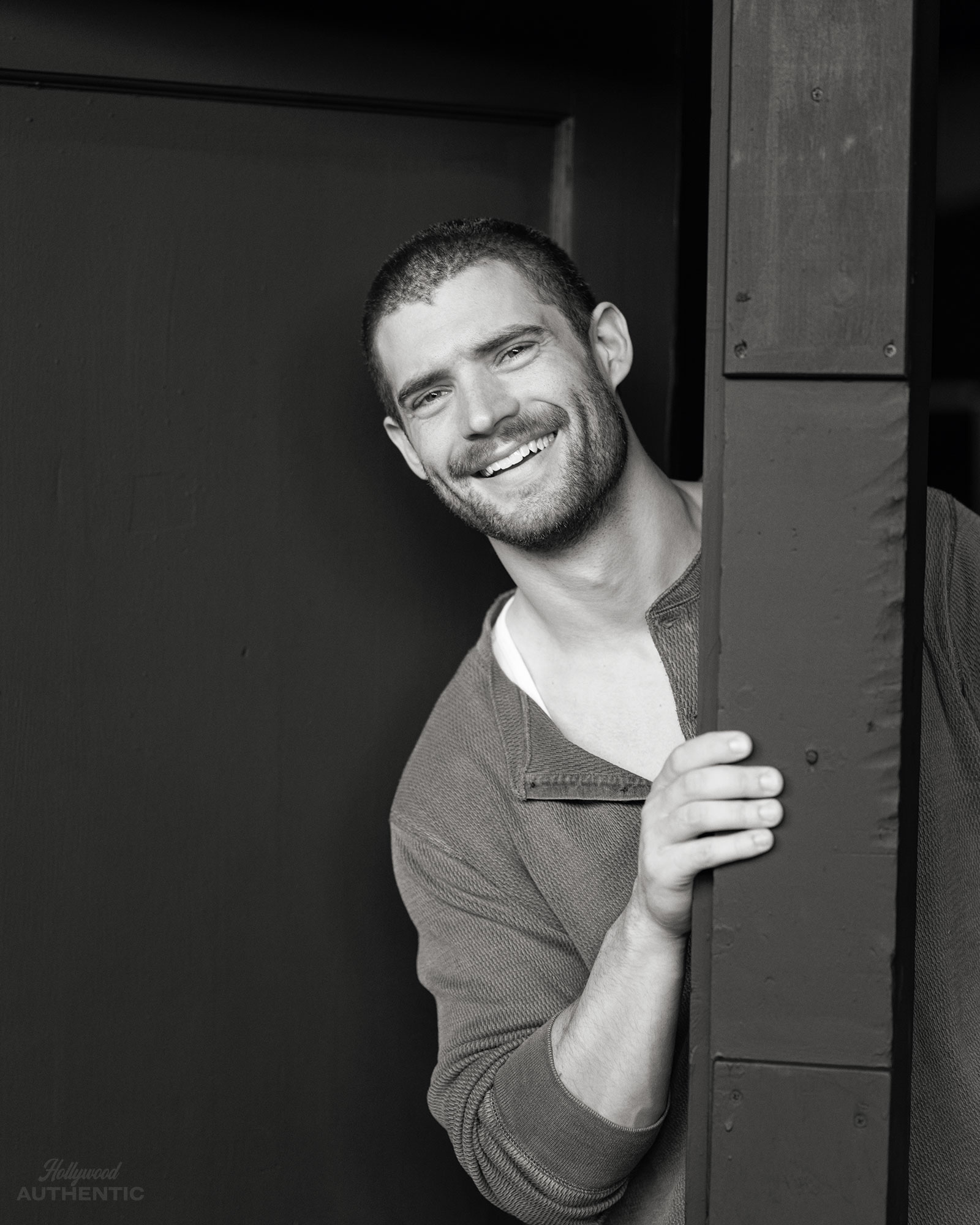
We move onto Theatre One, a black box theatre in the complex where Corenswet did his third-year productions and the wall of fame makes me think of another conversation we had on set. Where I suggested everything would change for him. ‘No,’ he disagreed at the time. ‘It’s just a change to one’s psychology. All the change was that I didn’t have to keep looking for a different job.’ I ask him if he still feels this way.
“No. But it’s not because I was wrong at the moment. It’s because you talked to me before we filmed the movie. And before you film the movie, all you know is that you get to film the movie. Now we’re a month away from the film releasing. We’ve released two trailers and a bunch of promotional materials. Billboards are going up… I think making the movie, and sharing the movie with the world, are two different things, and will have two different effects, and will change things in different ways. Nothing’s changed for me yet, really. I got to do another movie that I wouldn’t have gotten to do if I weren’t playing Superman. And I had a really, really wonderful and meaningful experience making that movie. [He’s playing real-life NFL running back John Tuggle in Jonathan Levine’s Mr Irrelevant.] At the moment, I mean, apart from going around the world to promote the film – the next two weeks are about as similar to the two weeks before I got Superman. I’m going to be at home, hanging out with my family – you know, watching movies, or cleaning, or cooking, or fixing stuff. You know, normal stuff. And I’m looking forward to that.’
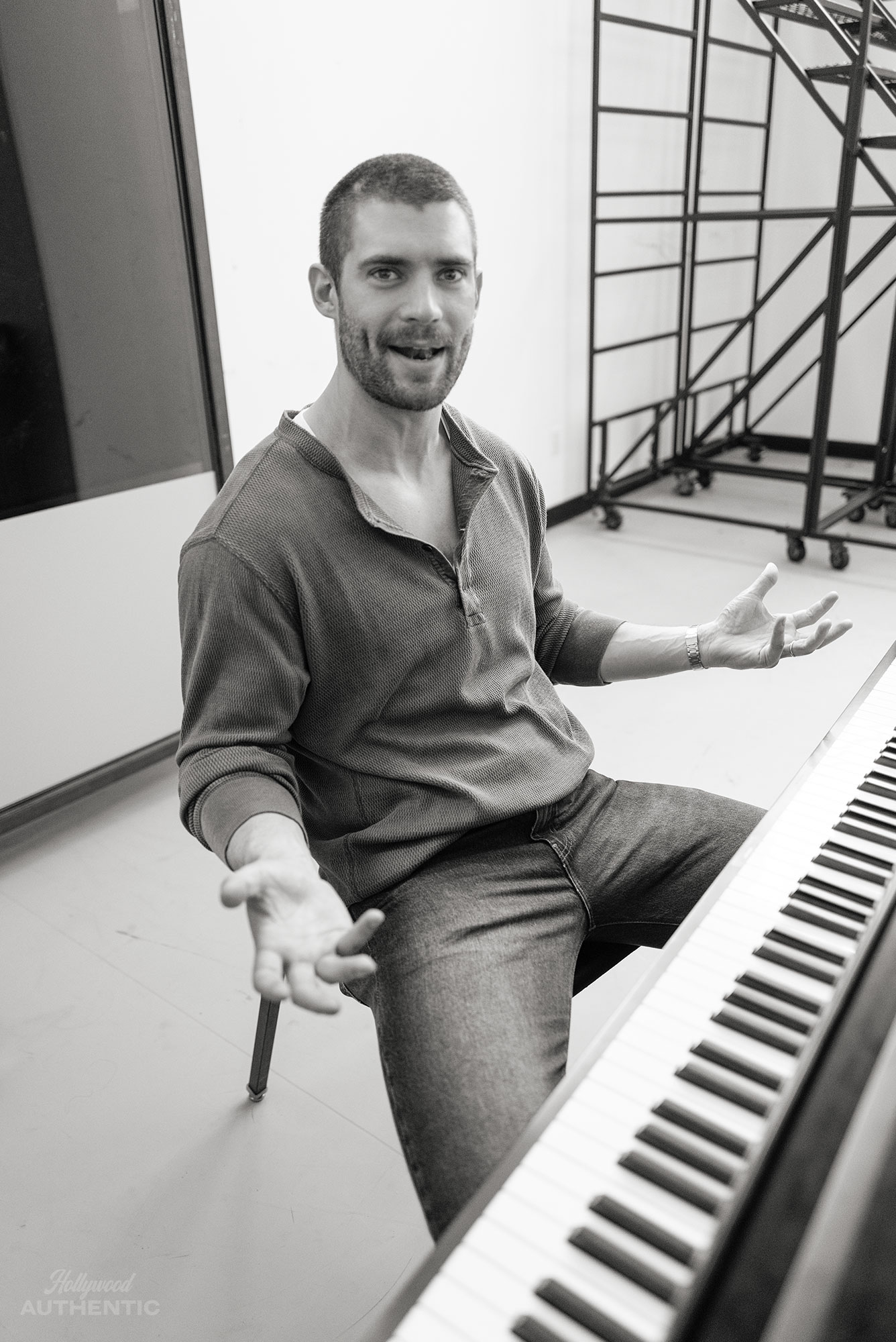
He and his wife have known each other since they did summer theatre together, growing up in Philadelphia. But as we stand in a place he graduated from nearly a decade earlier with aspirations to achieve the success he has, he knows that while his home life might not modulate, his professional life will. ‘If you asked me on July 12th, I’d probably be having some feelings, depending on whether we’re doing very well, what the critics have said…’ He pauses and then looks back at me with a grin. ‘I have this great, big collector’s edition Millennium Falcon Lego that my wife got me as a wrap gift when I finished Superman, and it’s still sitting in my closet at home. I saw it the other day, and I thought, ‘Maybe that’s what I’ll do on opening weekend. I’ll just turn my phone off, and do this enormous Lego for two days.’ So maybe I won’t be apprehensive then either, because I’ll be too excited about my Millennium Falcon.’ He laughs.

We’ve released two trailers and a bunch of promotional materials. Billboards are going up… I think making the movie, and sharing the movie with the world, are two different things, and will have two different effects, and will change things in different ways. Nothing’s changed for me yet, really
I ask if he had confidence in getting the job when making his self-tape for Gunn and Safran. ‘No, mostly because I saw this sort of old Hollywood humour in it, like a Fred Astaire or a Donald O’Connor or a Jimmy Stewart humour. I was excited to do that, and I thought I’d do a good job with that, but I wasn’t sure that James had intended it to be that way. So for all I knew, that was not going to be what he was looking for, and I had just seen something that wasn’t really there. So there was no confidence that I was going to be the guy for the job.’
Did he have to have confidence in embodying self-assured Superman – and in stepping onto that Atlanta soundstage on that first day in the suit? ‘I had to fake some confidence doing that,’ he admits. ‘Walking onto this big soundstage with four or five dozen people standing around – lighting and filming and standing behind monitors. I didn’t know James that well by that point. But you go through the fear of people looking at the suit or looking at your hair… I just thought for this I should probably muster up some confidence, even if it was faux-courage, and just try to be as Superman-y as I could.’


Corenswet has been mastering performance nerves for a long time, having started as the son of an actor who later became a lawyer. ‘My dad, who was an actor for many years in New York after college, theatre, and some background work on some things – he saw an audition notice for nine-year-old boys, and thought, ‘I’ve got one of those’. I liked school. I liked the academics of school. But I always had this thing of like: why is this important? Doing theatre – it was much more immediate. You rehearse so that you know what you’re doing when the audience shows up, and the audience shows up because they’re paying money to see the show. I worked at a bunch of regional theatres in Philopterid. So I was about 16. I did theatre in school, and I did a summer theatre programme – Upper Darby Summer Stage – which was a great musical theatre. I took acting quite seriously for my age, but I couldn’t really compete in the musical theatre space. I was not as good a singer, and not as good a dancer, as most of my peers.’

Nonetheless, he got into prestigious Julliard. ‘I think getting into Juilliard was a bigger, clearer path change than when I got the role of Superman, because I was studying Psychology at the University of Pennsylvania, doing theatre extracurricular-ly. I had no idea what a path forward as an actor would be, even though I was still excited by it. And when I got the call that I’d gotten into Juilliard, that was the moment when I was like, ‘OK, well, I’m going to be an actor – at least for a while. At least, you know, until I get really good data that I don’t belong here, I’m going to be an actor’.’ If you show up to school every day for four years, you’re going to figure some stuff out, and you’re going to get better. But that was, I think, a very clear split in my path of like: ‘OK, you’re going to do this, and you’re going to do it 100% for a while.’

His experience at Julliard clearly paved the way for Superman in the roles he was initially assigned. ‘I was put into roles that were buttoned-up and logical; a lot of patriarchs, and a lot of first half of the twentieth-century young men. The first time I got to do something really crazy was in the beginning of my third year. I played a heroin addict in New York in the ‘90s.’ It’s probably no surprise then that an actor who excelled at playing golden-era Hollywood young men would land Superman, a character born in 1938 in Action Comics and a hero who is known for being thoroughly good and decent. Corenswet nods as we head back out the door. ‘This is what James said about this movie: it’s about Superman, who ultimately is a guy who’s a good person, who’s trying to do his best, in a world where being a good person and doing your best is not necessarily valued.’ I’m left feeling like there’s a real correlation between the amount of views the trailer had and the fact that we all might be looking for some hope and decency in a world where that’s lacking.
Photographs and interview by GREG WILLIAMS
As told to JANE CROWTHER
Superman is out in cinemas now

Words by JANE CROWTHER
If you liked Guardians of The Galaxy and the latter Suicide Squad, then James Gunn’s signature goofy take on Superman is going to hit all the right notes. As the new head honcho at DC (alongside Peter Safran) the filmmaker’s fingerprints are all over this reboot from the irreverent tone to the colour pop visuals, the needle-drop soundtrack to the easter eggs.
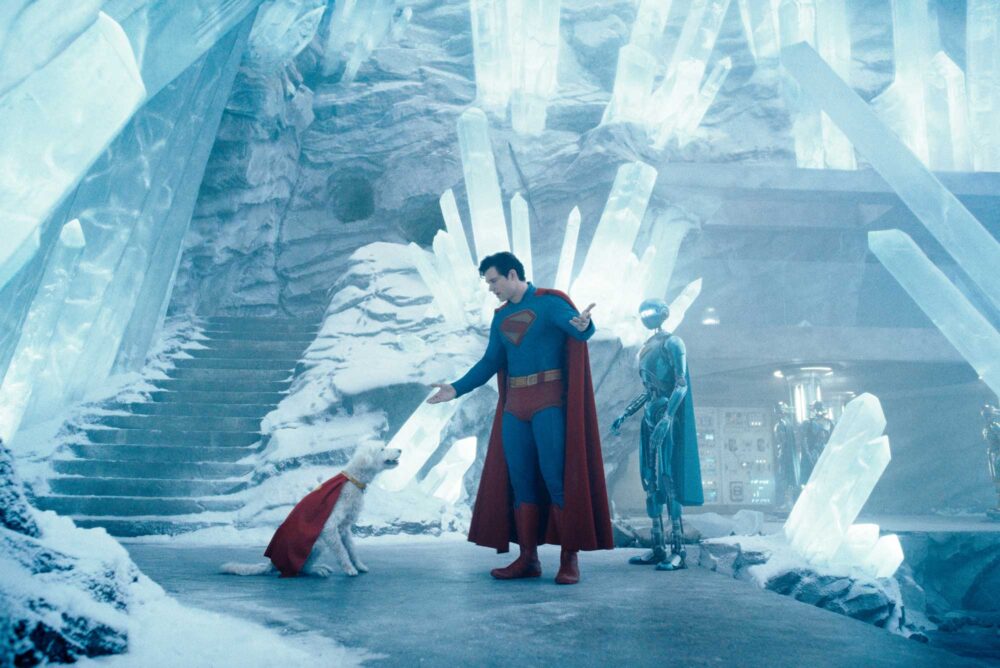
Instead of starting from scratch with an origin story, Gunn’s Superman plops us down right in the middle of the Man of Steel’s (David Corenswet) busy schedule. Having just stopped a war between two fictional countries (though real headline nations could easily be inferred from the geo-politics), he’s taken a beating from a mecha ‘Ultraman’, the design of tech wiz, Lex Luthor (Nicholas Hoult) and is lying in the arctic in need of help. Enter Krypto, an incorrigible super mutt who lives at Supe’s robot-staffed Fortress of Solitude and is MVP of the film whenever he pops up, one ear cocked. Superman is trying to negotiate his life as journalist Clark Kent, secret boyfriend to ace reporter Lois Lane (Rachel Brosnahan) and emblem for good. It’s not going so well. Lois may have the hots for Clark and the cape but she’s uncertain about the relationship, Superman’s media profile is iffy and his purpose is unclear despite his ‘aw shucks’ sweet optimism in the face of social media trolls, spin doctors and world politics. Luthor, it turns out, has an queer coded obsession with Superman that is driving his need to create pocket universes, establish conflict and rip a black hole in Metropolis. If that were not enough to contend with, Superman also has other superheroes to navigate: shapeshifting Metamorpho (Anthony Carrigan), Green Lantern (Nathan Fillion plus comedy wig), Hawkgirl (Isabela Merced) and Mister Terrific (Edi Gathegi, being truly terrific).
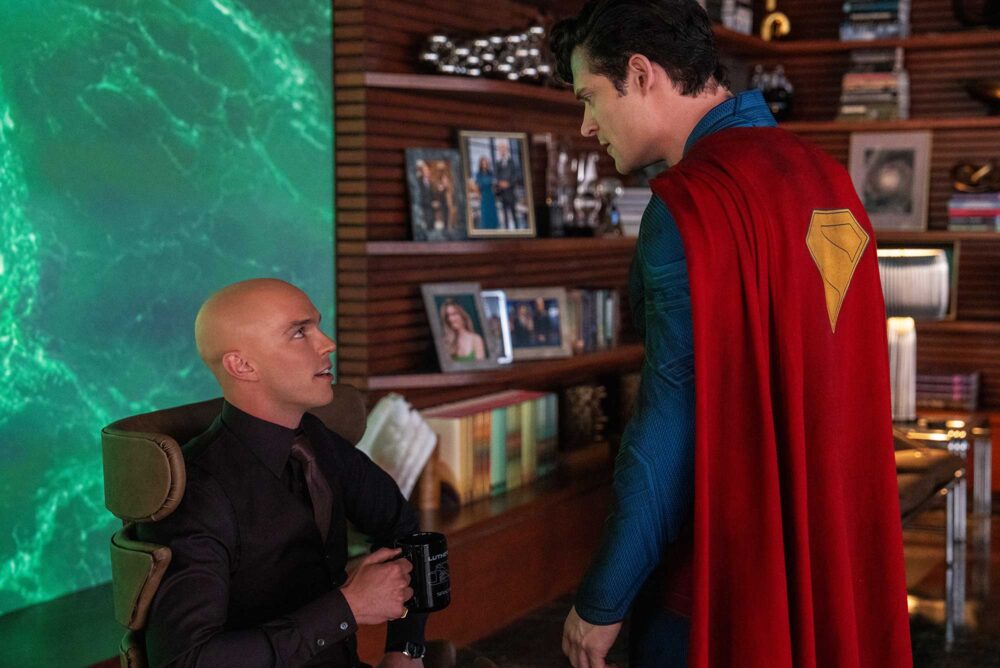
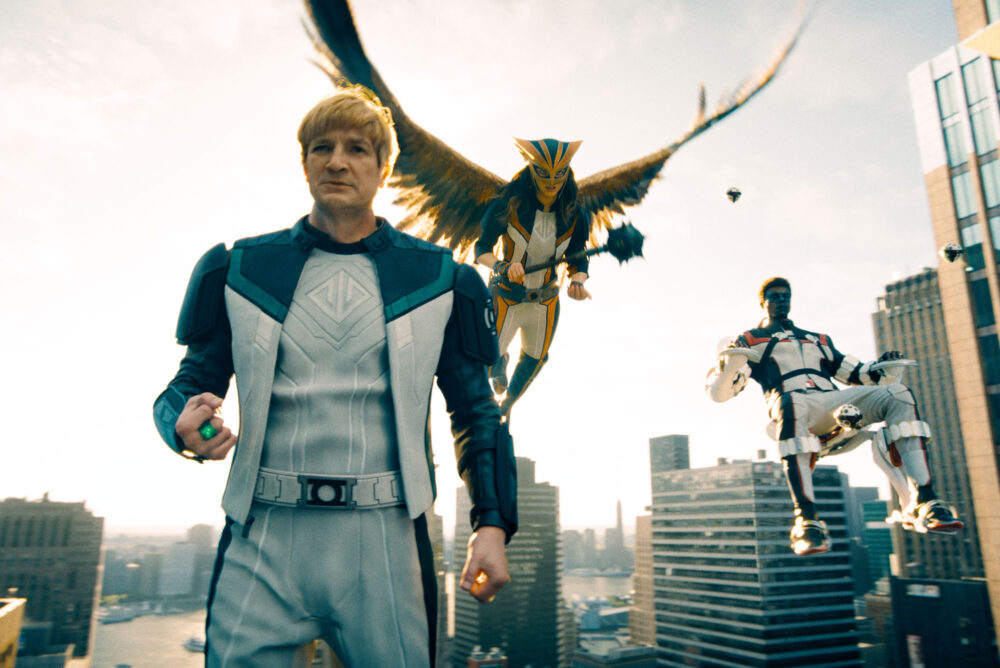
As Superman grapples with his identity and buildings cave, Gunn explores themes of imperialism, colonialism, immigration, social media and whether it’s enough to be merely ‘good’. In a zingy interview between Lois and Clark (and the most interesting part of the film) the duo flirt and fight over whether Superman needs to contextualise his actions; if, in today’s complicated and nuanced world, anyone can ever truly be non-partisan. It’s one of a number of moments that pulls Superman very definitely into the 21st century – there’s a cute explanation for why people don’t recognise Supes in Clark Kent’s glasses, monkeys on keyboards are literally represented, Luthor has a relatable vulnerability and Christopher Reeve’s son Will makes a cameo. But there’s also regression; Luthor’s airhead girlfriend seems out of another decade and there’s no getting away from CGI ‘destruction porn’. However, if you’re looking for laughs, a defiantly comic book world and a delightfully relatable Kal-El in Corenswet (who seems physically built for this with his expressive cornflower peepers and a jawline that might have been drawn), Gunn flies high.
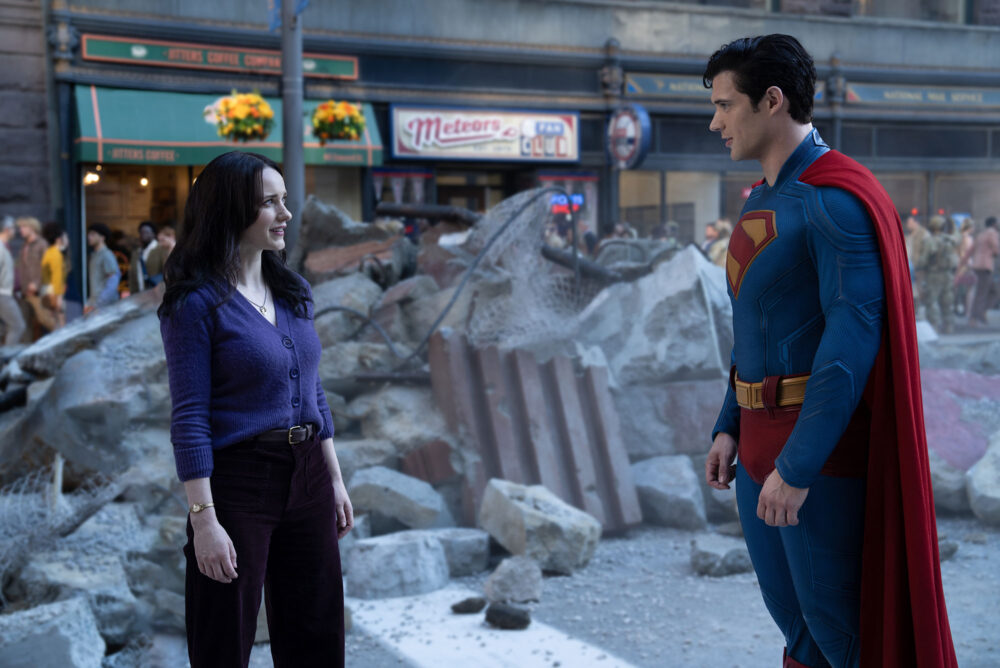
Words by JANE CROWTHER
Photographs courtesy of Courtesy of Warner Bros. Pictures
Superman is out in cinemas now
Words by JANE CROWTHER
In Gareth Edwards’ reboot of the JP franchise, set after Dominion but without any of the same characters, dinosaurs are old news. Dying in their zoos and no longer pulling the crowds, the only place they flourish is an equatorial island that is off-limits to visitors. Of course, big pharma, personified by Rupert Friend’s gimlet-eyed rep, won’t let a ban stop them from sending a team there to harvest dino DNA to find a cure for heart disease. Enter Zora Bennett (Scarlett Johansson) a special-ops hardass who’s struggling with morality after the death of a colleague and looking for a payday. Along for the ride, the obligatory palaeontologist Dr Loomis (Jonathan Bailey), swallowing his misgivings for a chance to see his obsession in the wild, and a salty seadog (Mahershala Ali) who’s going to boat them all to an ex-DNA experimentation lab long-abandoned on the island. Obviously, things don’t go to plan.
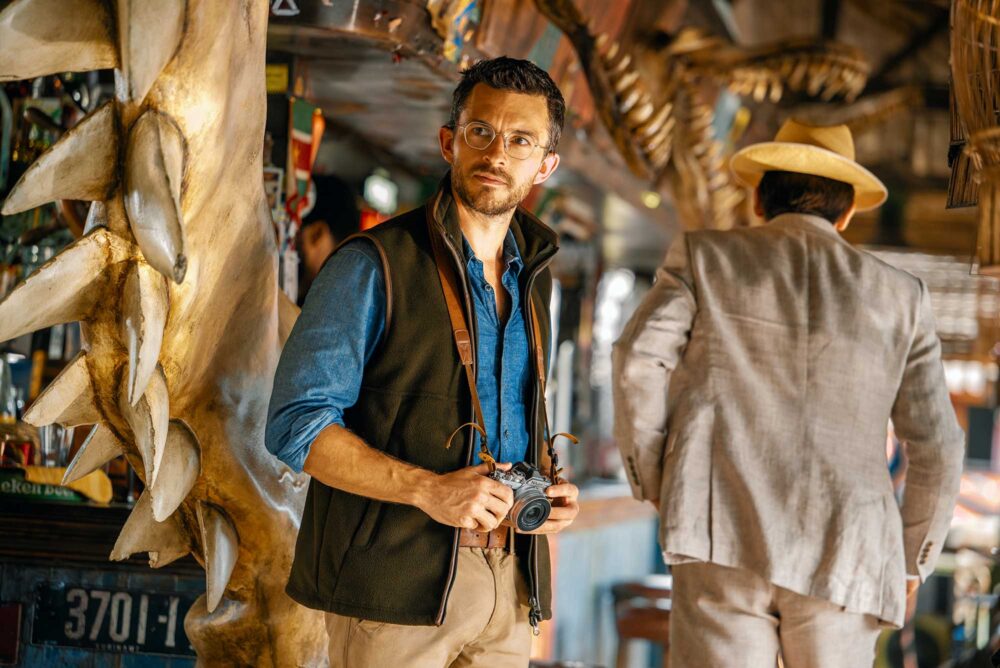
The first fly in the ointment is a family, inadvisably bobbing across the beast-infested ocean from Barbados to Cape Town in a modest sailing boat as a vacation (no, noone on-screen can understand why either). When their boat is capsized by a Mosasaurus, they become part of the group heading to the island – and prospective dinner for the previously extinct. As the team are shipwrecked, chased down a river by a swimming, gnashing T-Rex (an exemplary sequence that rivals the original’s first Tyrannosaur tete a tete), attacked by Quetzalcoatlus and observe a Titanosaurus romance, their perspectives and alliances shift as they hold onto the rescue hope of a helicopter arriving in 48 hours. Plus there’s a cute, portable Aquilops called Delores, who likes licorice.

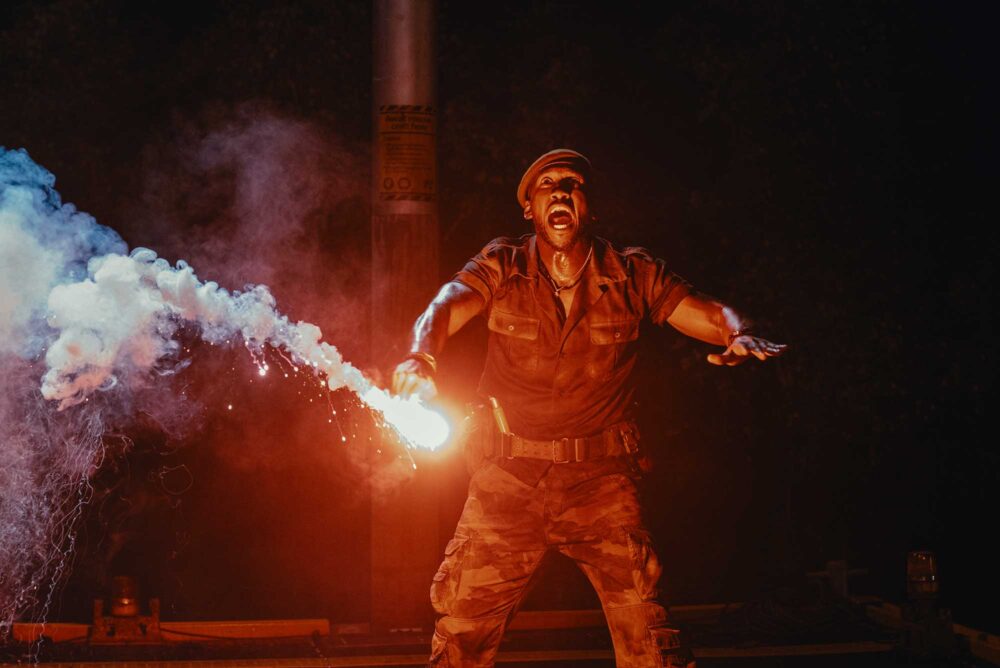
Essentially a theme park ride – boat rollercoaster, log flume, escape room, gift shop – Rebirth gets the recipe right with its casting. Johansson brings unexpected compassion to a rote role and is clearly having great fun alongside Bailey, serving as an audience avatar as he noisily eats mints, questions ethics and gazes in awe at CGI critters, rather like Sam Neill before him. Both are incredibly charming and sell a story as old as a mosquito in amber. Ali and Friend also seem to get the memo about nostalgic tropes; Ali is a charismatic cynic who becomes a hero, Friend, the all-out bad suit. It’s surprising he doesn’t get chomped on a toilet given the callbacks nodded to here. Less magnetic are the family and a pot-head boyfriend, though his jungle pee does provide humour.
Daft but decent, Rebirth doesn’t reinvent the wheel but it does manage to harness some of that original Spielberg magic and entertain for the time it’s on screen. And it will make you want to buy a Delores as soon as the lights come up – as well as a Snickers bar, such is the product placement.
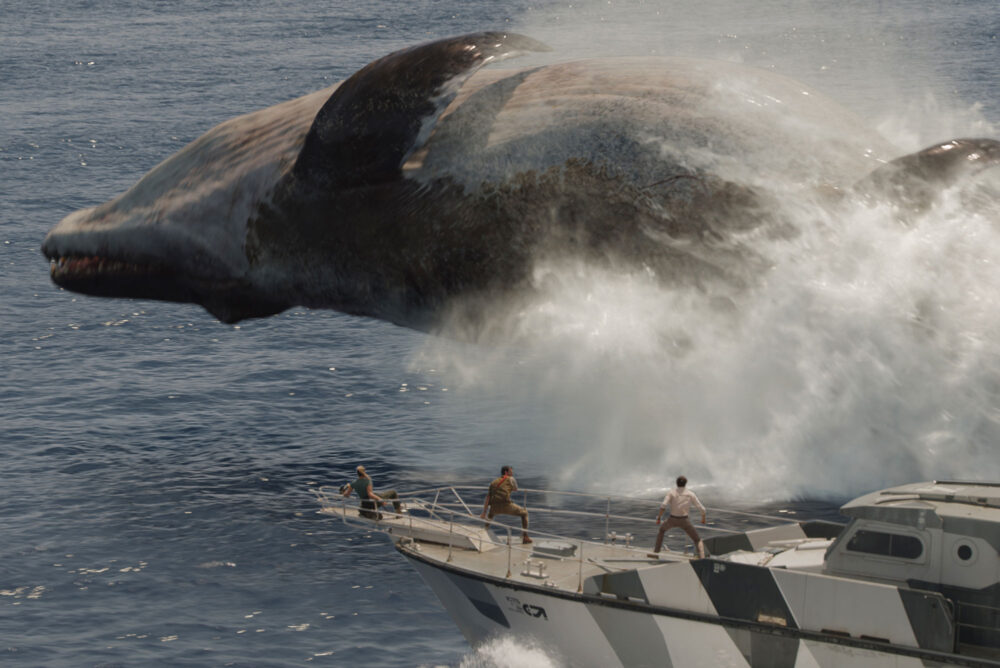
Words by JANE CROWTHER
Photographs courtesy of Universal Pictures and Amblin Entertainment
Jurassic World: Rebirth is in cinemas now
Words by JANE CROWTHER
Made by the same dream team behind Top Gun: Maverick, this high-performance star vehicle is pure popcorn entertainment that slipstreams Tom Cruise’s mega hit with dynamic racing scenes and a storyline that requires paddock-precision suspension (of disbelief). Yes, it’s highly improbable that a sixty-something renegade Indy car racer would be plopped in the number one seat of a F1 team and proceed to smash their cars and methodology to smithereens – but presented this slickly with as much star power to rival the horsepower, you’ll allow it.

Brad Pitt is our rebel, Sonny Hayes, an instinctively brilliant but unpredictable driver with a back scar from an accident when he was the hottest young driver in Formula one. Emotionally scarred (stunted?) by the incident, Sonny now lives out of his van while travelling from driving job to driving job, but never sticking around. While he can push his team to pole position with crafty moves, he’s not interested in glory – until Javiar Bardem’s F1 team owner, Reuben, comes calling with an eyewatering cheque and an offer to know that Hayes could be ‘the best in the world’. His team, Apex, has a hotrod technical director, Kate (Kerry Condon) and a young gun driver, Joshua (Damson Idris) but is lagging behind on the grid. During the next travelogue two hours, Sonny will race the global Grand Prix circuit throwing the rules out the window, romancing the brains of the operation and clashing with his hothead teammate. There’s some corporate shenanigans, F1 cameos (Lewis Hamilton produces) plus a soundtrack filled with stadium bangers and a propulsive Hans Zimmerman score.
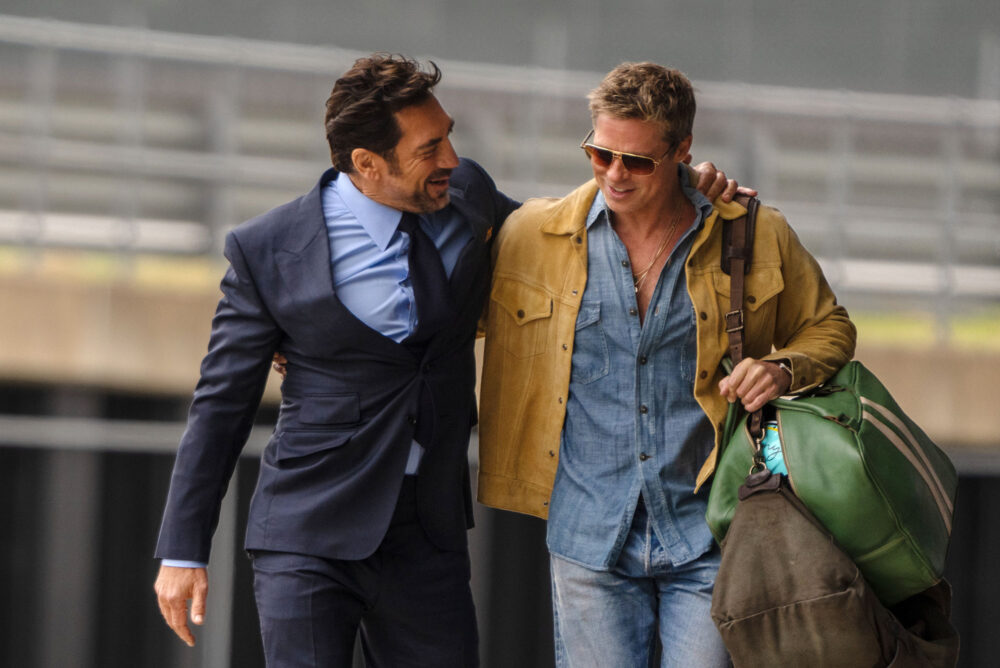
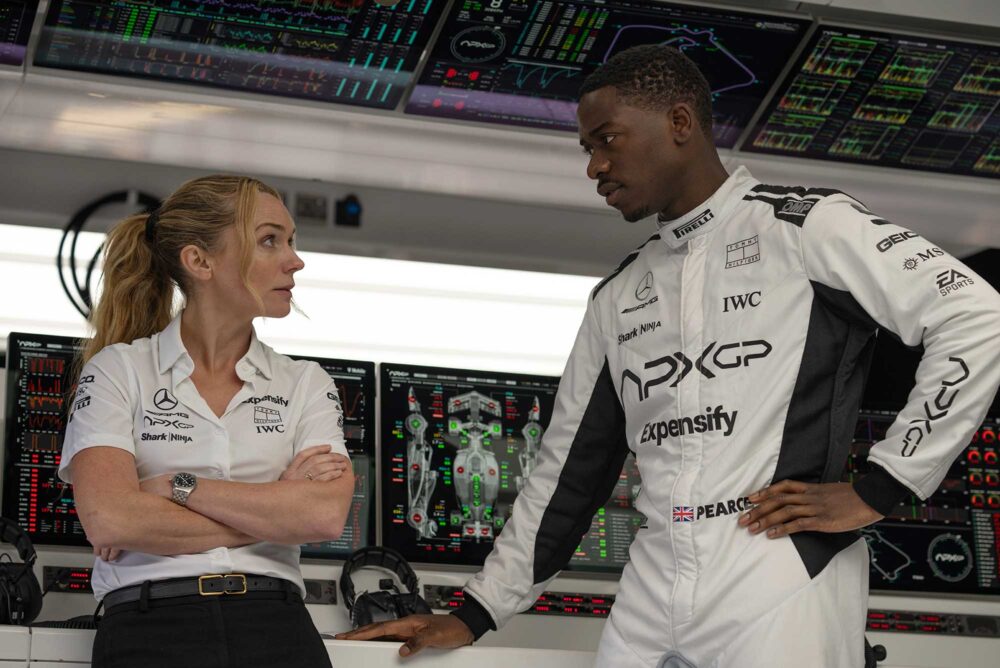
The races are joltingly visceral (especially the opening Daytona 24 introduction), giving audiences a glimpse into the claustrophobic, G-force, missile-on-wheels perspective on the track while the characters are elevated by polesitter performers. Condon in particular shines, her charming scepticism and beguiling way of delivering a sentence how you’d least expect it making Kate far more than a simple ‘love interest’, while Bardem barely flexes to steal focus – and that’s not even taking into account his spectacular suits. Idris holds his own against the charisma of Pitt, detonating that Thelma & Louise smile, the zero-Fs of Tyler Durden and the sartorial insouciance of Cliff Booth. If you’re going to believe a driver approaching his pension can outstrip Verstappen, Pitt is the man to do it.
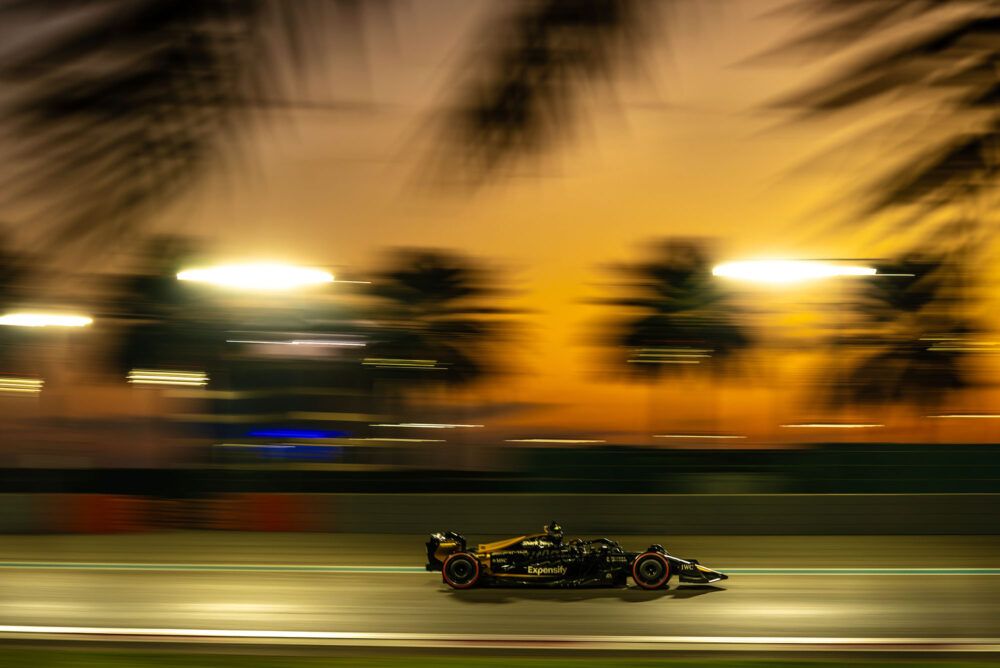
Words by JANE CROWTHER
Photographs courtesy of Warner Bros. Pictures/Apple Original Films
F1: The Movie is in cinemas now
Words by JANE CROWTHER
Danny Boyle’s return to his ‘infected’ fable delivers the same nail-chomping tension, social commentary and energetic cinematography/soundtrack mash-up as his 23 year-old original – but now with added nightmare fuel, humour, hope and yes, profundity. As a meditation on mortality and Britain it’s unsubtle, but it’s also thrilling, moving and weirdly life affirming. It could be the best 115min you never spent in therapy.
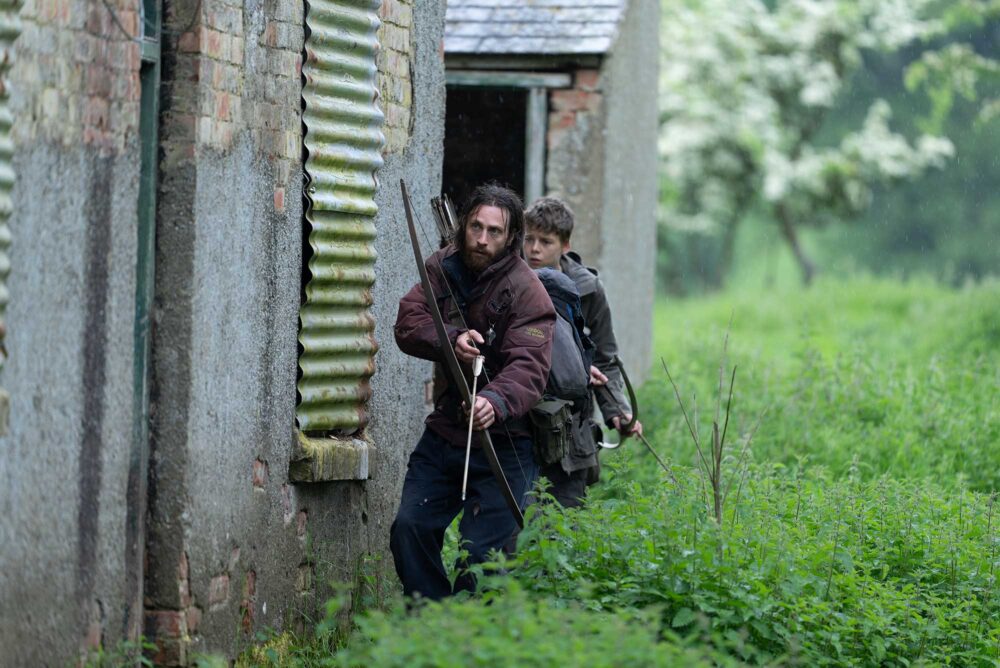
In 28 Days Later we had Cillian Murphy’s bewildered patient waking up in an abandoned London, in 28 Weeks Later (not written by Alex Garland or directed by Boyle) we had survivors holed up in a clean sector of the UK’s capital. Now we’re a couple of decades after the original outbreak of the rage virus and Britain is a quarantined island of naked body slurpers, the rest of Europe leaving normal lives while sending their fleets to patrol the coastline and ensure the madness stays within this scepter’d isle. Very Brexit.
While the mainland is over-run with grubby infected (fast-sprinting, slow and low, souped up ‘Alphas’), a group of survivors are self sufficient on Lindisfarne island having lapsed back into traditional roles and religious worship where the women raise children, teach and cook and the men protect, hunt and gather. When they want a party they drink home brew and sing ‘Delilah’ by Tom Jones while dancing by candlelight. Very Wicker Man.
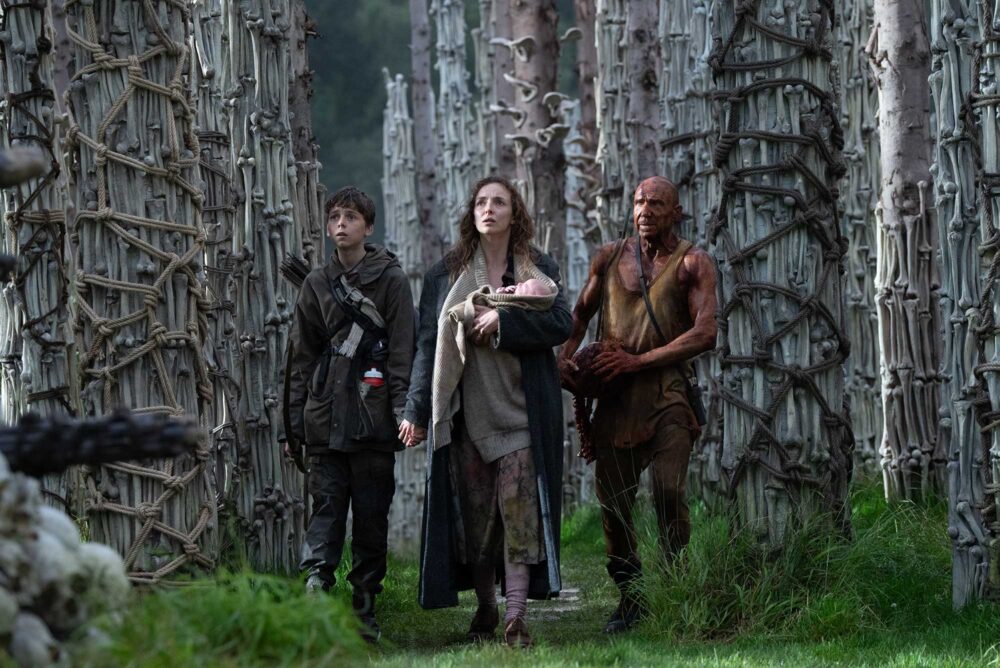
Jamie (Aaron Taylor Johnson) is an enthusiastic killer of the infected, who wants to take his 13 year-old son Spike (Alfie Williams) on his first hunt on the mainland, leaving his disorientated, ill wife Isla (Jodie Comer) to rant in her sweat soaked bed. The duo set off for a horrifying trip where blood splatters, the rules of the world are established and the glimmer of other life is seen through the trees. A fire burning far away could be evidence of the Kurz-like Doctor Kelson (Ralph Fiennes). By the time you’ve bitten every nail off, Spike and Isla are wandering through the wilderness of the North of England (and in a nod to recent British lunacy, past the Sycamore Gap) and meeting various zombies, a stranded Scandinavian sailor and the good doctor who has developed an ashes-to-ashes methodology to find solace in the dead…
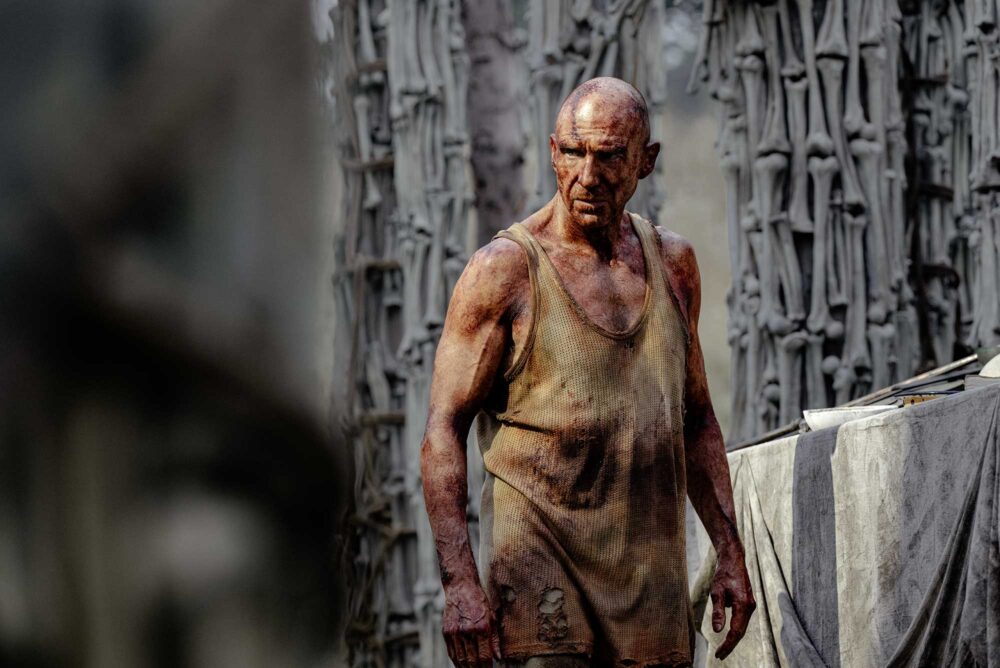
While still trading in jump scares and the mouth-drying fear of being hunted, Boyle and Garland are now more interested in finding the beauty in the horror. There’s moments when a thousand strong herd of deer undulate across a hillside, when Kelson explains his form of worshipful remembrance, when zombies splashing in a bucolic river look almost like forest sprites. And moments of human tenderness – the understanding between women that crosses insanity, the strength of a mother, the bittersweet taste of losing someone adored. How to love and lose is better than to never love at all. Tears will be shed on account of Comer’s stealth performance which sneaks up and gut-punches straight after an enjoyably silly bit concerning plastic surgery and a Shell petrol station missing its ‘S’. Fiennes is predictably perfect – iodine orange and making the most sense in a post-Covid world. The left turn comes at the end with a Jack O’Connell teaser for the sequel that nods to Jimmy Saville and a ride even more wild than this one. An infectious promise.
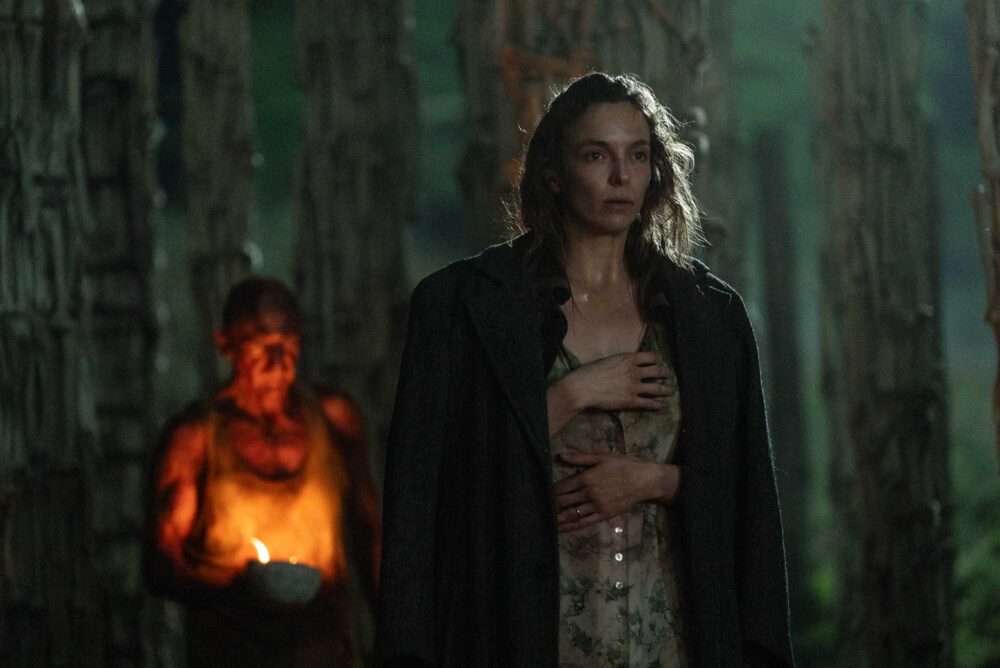
Words by JANE CROWTHER
Photographs courtesy of Sony Pictures Entertainment Inc.
28 Years Later is in cinemas now
Photographs & interview by GREG WILLIAMS
As told to JANE CROWTHER
Kaia Gerber invites Greg Williams to her theatre dressing room and discusses her voyage of discovery in her acting career.
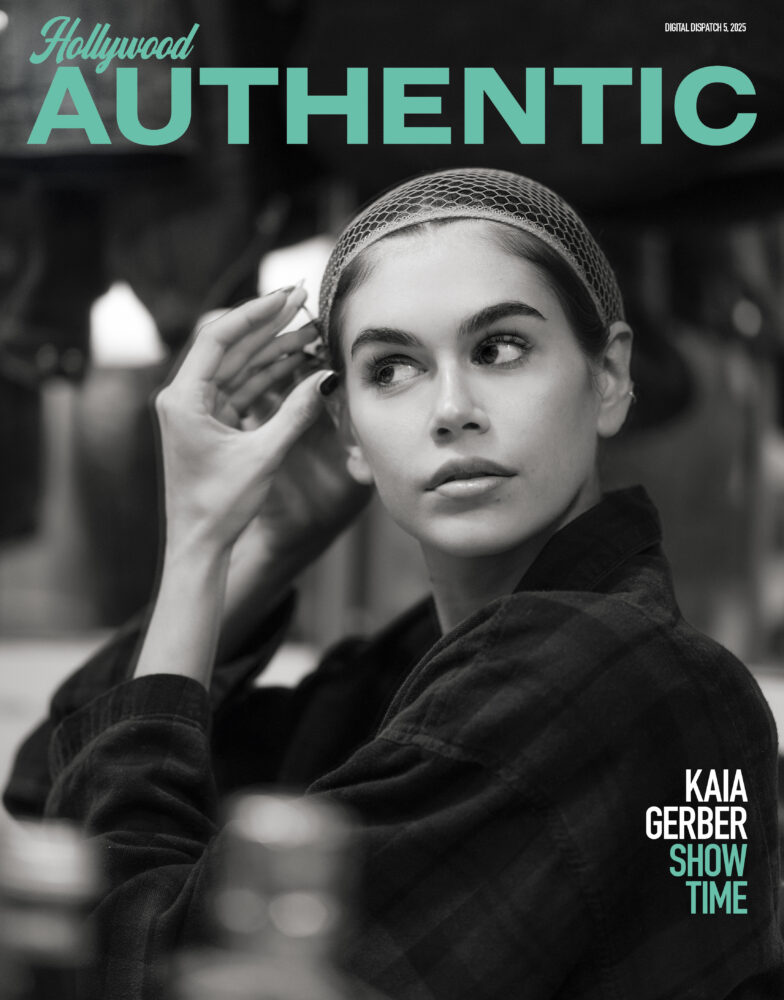
Kaia Gerber’s nails tell the story of her life. When I meet her at her Hollywood Hills home on a sunny Saturday in February, I notice her perfect almond manicure with chipped black nail polish over the top. She invites me inside and explains they represent two very different jobs she’s juggling at the moment. ‘During the week I have perfectly manicured nails for season two of Palm Royale,’ she says of revisiting the role she has on the Apple+ TV show as Mitzi, the not-as-daffy-as-she-seems beautician. ‘Then I put black nail polish stickers on top during the weekends, and I chip it. By Monday they’re perfect again. But this is a representation of my life right now, because the black nail polish is very Jane Jr., who I play in [live theatre play] Evanston Salt Costs Climbing, and then the beautiful manicure is very Palm Royale…’
Gerber has received rave reviews for her performance at the Rogue Machine Theatre on Melrose, where she plays a fragile young woman wrestling with mental health issues five shows a week. She has invited me over to hang out as she gets ready before her Saturday matinee, filling her downtime from filming Palm Royale with an acting job that is helping her finesse her craft. That student’s approach to work is also evident in the self-confessed bookworm’s love of reading and learning – as she gets her things together in the kitchen, I notice a baseball cap and tote branded with her hugely successful online book club, Library Science. ‘It’s shameless self-promotion everywhere I turn!’ she laughs, admitting she’s even been specifically nerdy about the type of highlighter pen the site sells. ‘I think partially because I didn’t go to college, I don’t associate literature with studying. I have a friend who went to NYU, and now he is a librarian, and has the greatest library in London. He would take me to the bookstore and assign books to me. But it felt fun. That’s how I started reading. And now I can’t stop. Library Science started during the pandemic. I was just doing interviews with people on Instagram Live, because I always wanted to be in a book club, and none of my friends wanted to do that with me. It just grew from there. We curate libraries for hotels or private homes. It’s the dream job. Now I do the interviews pre-recorded, thankfully, because anything live is really scary.’
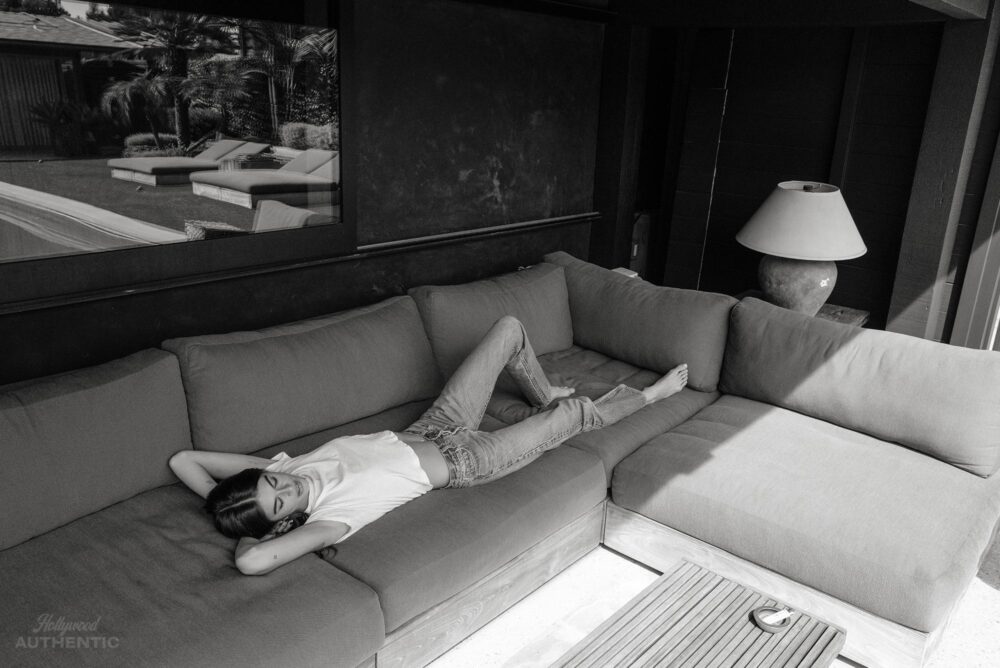
For someone who finds live events scary, Gerber has been facing her fears (twice a day on Saturdays) with her role in Evanston Salt Costs Climbing – playing a part that demands singing, dancing, tears and introspection in an intimate theatre environment where she can lock eyes with her audience. Though she is a successful model (and the child of one), the Malibu native grew up loving theatre and felt the pull back towards it after a film debut in Babylon and roles in Bottoms and Saturday Night, and TV roles in American Horror Story and Palm Royale. ‘That was my first love. And then I started doing film and TV. But I’d always wanted to go back to it,’ she says as she gets comfy on her sofa in a lounge with floor-to-ceiling windows overlooking the garden. ‘But it’s scary. There’s nowhere to hide, and in modelling I got quite used to hiding and being able to conceal. Theatre terrified me, which made me realise that I needed to do it again.’ The process of doing theatre has been revelatory for her. ‘There’s something kind of thrilling about knowing that you could go up there, and you could do whatever you wanted, and that will be what happens that day. When you’re doing television, you rehearse once right before you film it. Almost every single day that I leave a film set, or I’m driving home, or when I’m falling asleep, I’m like, “Oh, that’s how I should have done it.” And when you’re doing a play, you can wake up the next morning and then try that thing.’
Being part of a company, where she does her own stage make-up and organises her own costume and props, has also been a gift. ‘I had this awakening, realising how almost infantilised you can be on a film set. You get there, and they do your make-up, your hair, physically put you in clothes, they hand you your prop, and they tell you where to stand. It’s like you have a babysitter all the time. But doing theatre, no one’s telling me what time I have to be there. I choose. No one’s telling me how to get ready or how to prepare. You’re forced into this place of figuring it out.’
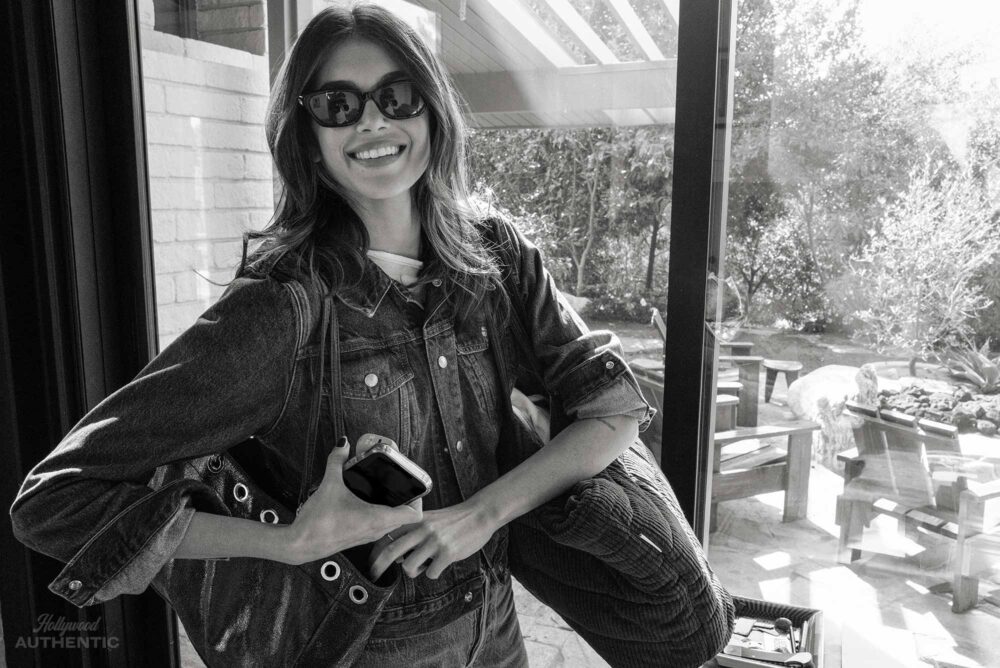
The tempestuousness of that experience has been twinned with the fast-paced filming of season two of Palm Royale during the week. ‘They couldn’t be more on opposite ends of the spectrum,’ she says of the two roles. ‘But I also appreciate that because I’m not able to stay in one too much. A lot of who Jane Jr. represents is the darker parts of myself, and these dark thoughts that I’ve had. So I actually get off the stage, and I’m like, “OK, I’ve acknowledged that dark energy for the day.”’ There was certainly dark energy when, during the rehearsal period, the LA fires started. Gerber grabbed her dog, Milo, and her first-edition books and evacuated, not knowing if the play would go ahead or even be something the LA community would want to see in the wake of such tragedy. ‘We were all of a sudden like, “Oh, we’re talking about the end of the world in this play, about climate change, about this existential feeling of dread. And now we’re looking at how this sky is on fire, and this is all really happening,” she recalls. The show was only delayed and Gerber has found audience reactions gratifying. ‘What has made me really love the experience of doing this, is that people come up after and they’re like, “Me too”. It’s devastating that everyone relates to it, but it’s also comforting, I think.’
We go outside to soak up a little sun before heading to the darkness of the theatre and I ask how modelling now fits into this performing life she is carving out for herself. ‘Modelling has a performative aspect to it that ties into acting,’ she says, rocking on her chair on the deck. ‘But modelling is so much the awareness of the camera and you’re trying to look appealing. In acting you have to forget all that. That’s something I’ve had to unlearn and that was the freeing part. I still model sometimes. But the greatest gift it’s given me is that it’s allowed me to do something like this play, where I’m just doing it because I love it. It’s allowed me this freedom, especially as I’m just starting, to just do the things that I love – not for any kind of financial gain.’
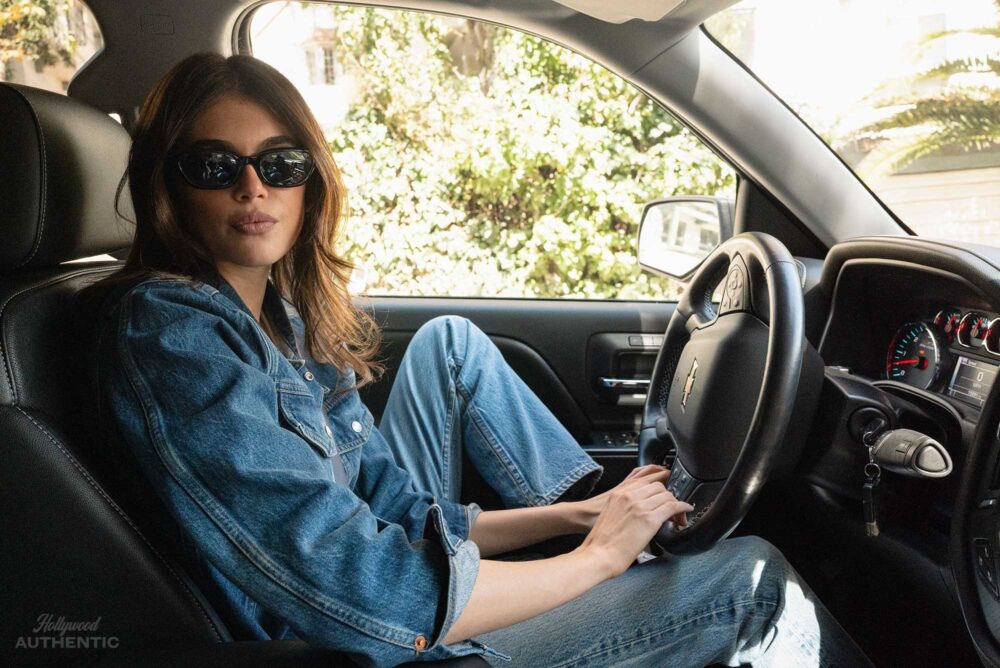
I still model sometimes. But the greatest gift it’s given me is that it’s allowed me to do something like this play, where I’m just doing it because I love it. It’s allowed me this freedom, especially as I’m just starting, to just do the things that I love
As Gerber gathers her matcha tea, smoothie and an energy drink with ‘a diabolical amount of caffeine in it’ to keep her going through her performance, we talk about turning fear into excitement. ‘They’re such close feelings. I don’t think you can hate someone unless you’ve loved them. If you shut down fear or anger or sadness, you can’t do that without shutting off excitement and happiness and love. I would rather feel. Some of the most painful moments of my life, I can look back and be like, “Pain is an indication of how much you cared and loved.”’
We hop in her monster pick-up truck (on loan from her dad) and wind our way down the canyon to the theatre. While stuck in LA traffic, she tries the ‘impossible task’ of narrowing down her five favourite books. ‘Maybe five most formative. Just Kids by Patti Smith. The Lover by Marguerite Duras. Clarice Lispector – all of her books; all of Joan Didion. And maybe Camus – The Stranger. Right now, I’m revisiting Anaïs Nin. I’m rereading Frankenstein. And a lot of Linda Gregg and Jack Gilbert poetry.’ I ask if she’s tempted to write herself. ‘It’s the art form that I respect the most. I think my taste level is so much higher than what I could accomplish, and that’s a very difficult position to be in. But I’ve always written songs and poems. I would love to start adapting novels and books. And I would love to go back to school and actually get a degree in library science. I think that will happen, probably in the future.’ She does not, she says, simply want an easy life. ‘Who said that was a thing to achieve? Who put that as the ultimate sign of happiness? I don’t think that that’s the goal. The goal is contentment.’
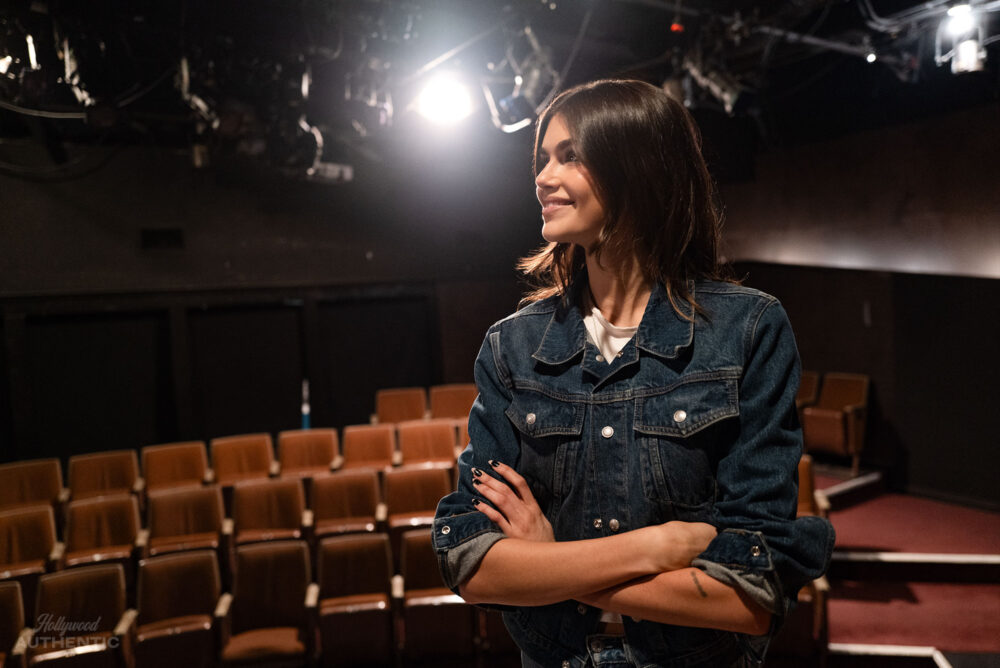
Gerber gets to the theatre early to set out her things, walk the stage, get into hair and make-up and warm up. As we squash into her cosy dressing room (which is shared via a dividing wall with her co-star, Hugo Armstrong) she applies her pale make-up, gets changed and winds her hair on her head in readiness for the wig she cut herself. As she completes the transformation, she stares in the mirror at herself. ‘There she is, there’s Jane Jr.’. It’s approaching curtain up, and Gerber keeps an ear out for the music that denotes the audience arriving in the auditorium and sips Throat Coat tea to prep her voice as she does vocal warm-ups. When the show starts, she listens to the audience from the side of the stage, gauging the people she’ll perform for. ‘We’ll see what it is today.’ After the show, she likes to mingle with the audience in the lobby. ‘I’ve felt like I’ve been able to really get into really deep conversations with people after the play that I normally wouldn’t, just upon meeting someone.’
I leave her to join the audience and watch the show. Personally, I thought she was incredible, her characterisation recalling something of the fragility of Shelley Duvall in The Shining. The Stage and Cinema review describes her as an actor ‘shedding her chrysalis…delivering the production’s most startling revelation’. After the show, I find backstage bustling with well wishers, one woman crying with the emotion of Gerber’s performance. She is tired but happy, and ready to do it all over again in the evening performance. What has this live experience taught her on-set? ‘It really got me comfortable with embarrassment. I felt much freer on set because I was just more comfortable with going through these really big feelings with an audience around me. Just learning that whether the audience is the crew on a film set, or an actual audience paying to sit and watch – not to try to ignore that, to be accepting of that and use it.’

I feel lucky enough to have been able to focus on being a small part of these really incredible projects with filmmakers that I look up to so much. I love seeing the choices that actors make, and trying to connect those dots
I leave her to rest between shows and we catch up with her again the day after the Oscars, when Gerber attended the Vanity Fair party in ethereal 1997 couture Valentino. ‘I’m alive and ok!’ she jokes, post-celebrations, while driving her truck. She has only a few shows left at the theatre and is finishing up on Palm Royale where she teases that her character will have ‘quite an evolution’ in a way that she could be talking about herself as a growing artist. ‘Nobody really takes her seriously – even audiences. But how aware is she of the way that people perceive her, and how can she use that to her advantage?’
Gerber’s sharpened toolbelt of acting skills will be seen in a number of buzzy upcoming projects. She’ll appear in Outcome, a Hollywood-skewing comedy from Jonah Hill where she’ll play an actress opposite Keanu Reeves, movie star experiencing an epiphany. She also has a role in Shell, Max Minghella’s dark comedy about a wellness guru, and in David Lowry’s Mother Mary, starring Anne Hathaway and Michaela Coel. She will also feature in TV show Overcompensating, following a student hiding his sexuality. ‘I feel lucky enough to have been able to focus on being a small part of these really incredible projects with filmmakers that I look up to so much. I love seeing the choices that actors make, and trying to connect those dots.’ Having nearly finished the run, what has she learned from doing the play? She pauses for a moment. ‘Doing the play was everything you are told not to do in front of people, that you know is opening yourself up for criticism – dance, sing, cry, scream. So it opened up my mind to: “Why have I limited myself from doing these things?”
Photographs and interview by GREG WILLIAMS
As told to JANE CROWTHER
Outcome, Shell and Mother Mary will be released in cinemas soon. Overcompensating is streaming on Prime Video now

Words by JANE CROWTHER
Writer-director John Maclean follows off-beat Western Slow West with more genre-spliced fare – this time a Scottish oater/samurai actioner. In the blustery 1790 glens we meet a young Japanese woman (Kôki) running for her life across moors and through forests. In pursuit, a motley team: leader Sugarman (Tim Roth), his son Little (Jack Lowden) and a crew of desperate thieves and murderers who’ll slice the throat of a random circus performer as easily as a colleague who failed a mission. The Sugarman gang are looking for gold that they believe the girl knows the location of – and in a midsection flashback, we’ll discover if she is merely another pawn in their path of destruction or if she has skin in the game.
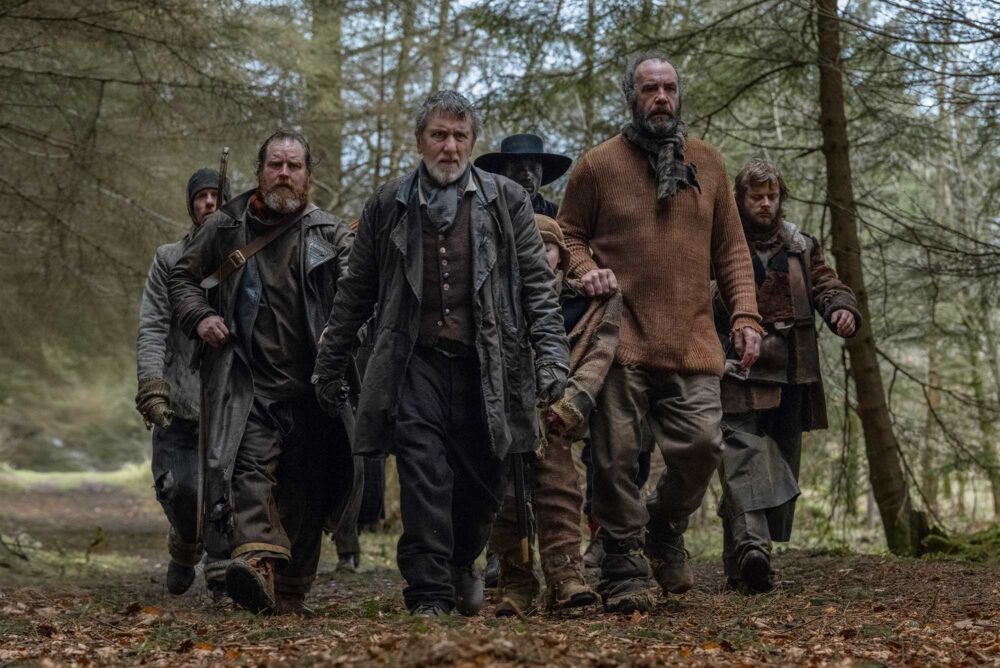
As the marauders trash a stately home, the wagon of the girl’s father (Takehiro Hira) and the camp of an acting troupe (led by Joanne Whalley), the woman at the centre of the story turns from quivering quarry to an avenging force, and Sugarman’s infantry start to drop. ‘Remember my name, Tornado…’ she intones darkly while wielding a blade. There will be blood – spurting out of slick throats and lopped-off limbs…
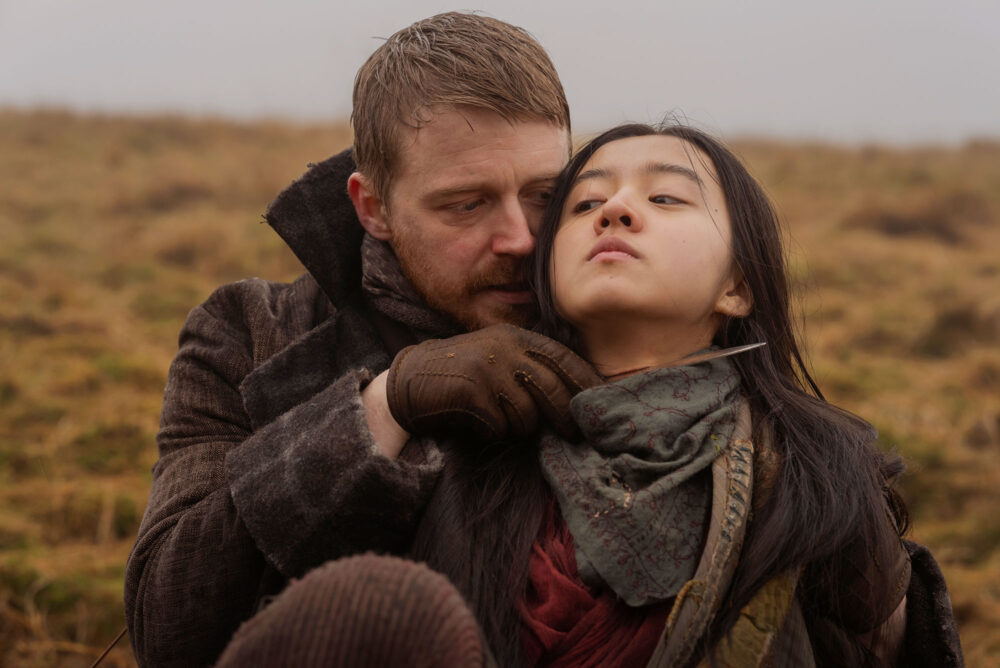
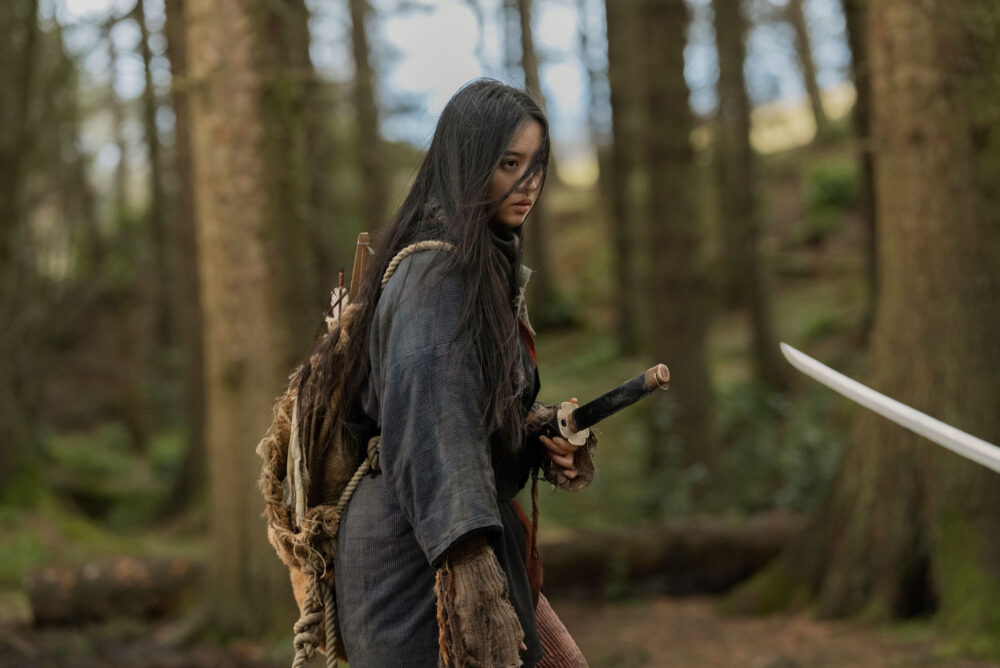
Roth can play this sort of casual menace in his sleep and his relaxed brutality towards his lads, his son and anyone in his path is chillingly effective. Lowden, playing off Roth’s energy, becomes a nasty piece of work, while Kôki manages to sell her arc from girl to goddess in a screenplay that asks for little sympathy for anyone. The characters all circumnavigate a boggy lake and damp woods as their morality play unwinds – like souls in purgatory, tethered to a place. Audiences will need to accept this conceit to get the most out of people constantly bumping into each other when there’s plenty of directions to run. But, welcome the dreamlike quality of proceedings (helped by beautiful lensing by Robbie Ryan of brackish waters, auburn grasslands and fairytale forests whipped by gale-force winds) and Maclean’s rain-lashed, dark fable will cast a spell. And make you yearn for a cosy blanket.
Words by JANE CROWTHER
Photographs courtesy of IFC Films
Tornado is out in cinemas now
Words by JANE CROWTHER
That title is somewhat cumbersome but Ana de Armas’ off-shoot of the Keanu Reeves action franchise is thankfully more cut and thrust. No such exposition in this brisk 90-minute knock-em-down set during the third John Wick instalment which opens with flashback as a wide-eyed child watches her father killed by ‘The Chancellor’ (Gabriel Byrne) and is taken in by Angelica Huston’s ‘The Director’ of the Ruska Roma to be trained as both a ballet dancer and an assassin. Growing into de Armas’ Eve Macarro, the ballerina begins to question the ethos of the shadowy world in which she lives when she discovers a lead to The Chancellor during a protection gig. Like Wick before her, Eve may trade in death but the demise of a beloved sets her on a scorched earth path to revenge – tracking The Chancellor and his cult to New York, Prague and a delightful alpine village full of contract killers in cosy knitwear.
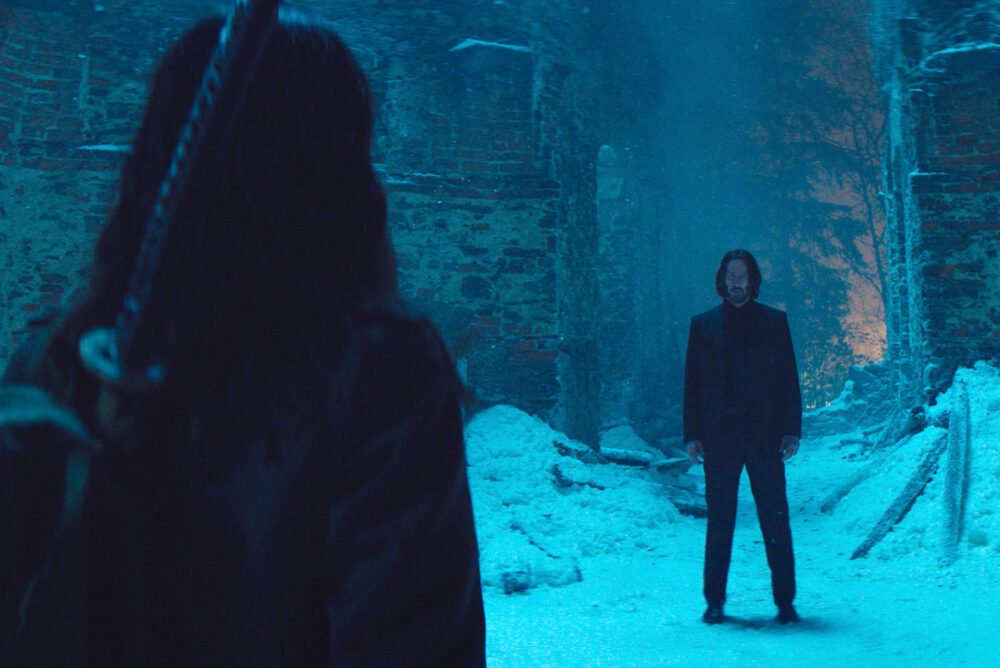
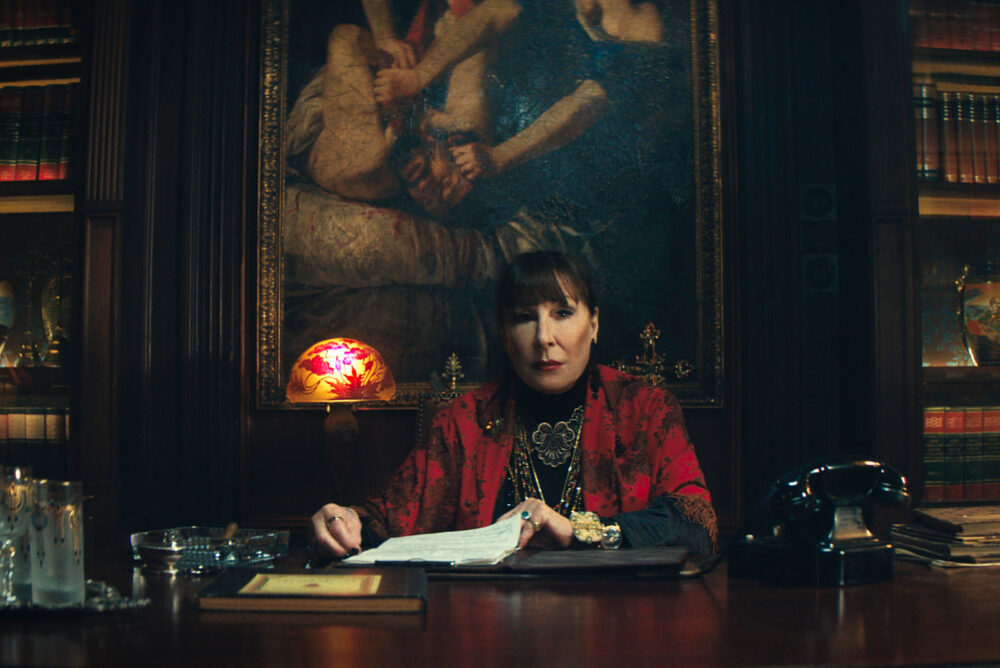
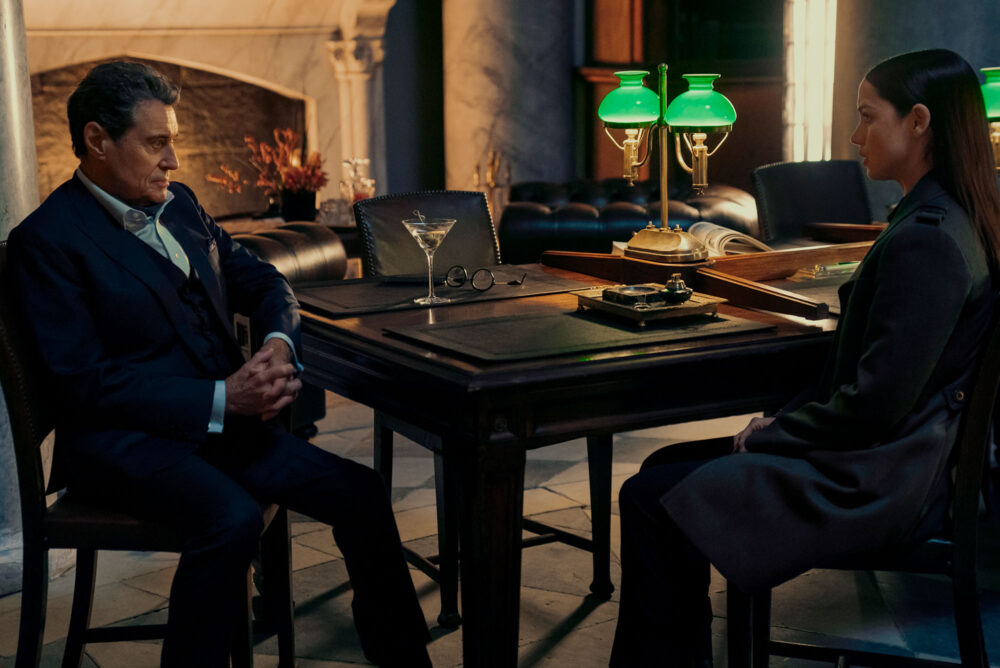
Throughout her odyssey Eve does what she was taught at Ruska Roma – to ‘fight like a girl’. That means inventive deployment of household objects (pans, skates, ice picks, plates), using her smaller stature to outsmart hulking goons (grenade headache being a highlight) and fighting yin with yang (a fire hose vs flamethrower set piece sizzles). Like Wick, she seemingly has rubber bones and doesn’t spill a great deal of blood apart from the most attractive of grazes, but Ballerina isn’t much interested in logic or reality. Those who’ve already spent time at the Continental Hotel will understand the drill and de Armas displays as much charisma as Reeves in making relentless stunts entertaining (the Director might as well be saying ‘again’ repeatedly as she does during dance rehearsal). De Armas more than matches Reeves when they meet for a brief, bruising encounter and ensures he’s not missed when he departs.
Consolidating the action promise she showed as a scene-stealing Paloma in Bond’s No Time To Die, and sharpened in Ghosted and The Gray Man, de Armas is setting up Ballerina for a franchise and has zero figs to give about pausing for breath, let alone an exploration of who Eve is away from a fight. That will surely come in future films – which, based on the star’s assured performance, are as much of a given as the fact that this pirouetting killer will definitely make use of everything in an armoury (including a covetable flame retardant coat) when she breaks into it. ‘Cool,’ she nods in approval on opening a box of lethal weaponry. Well, indeed.
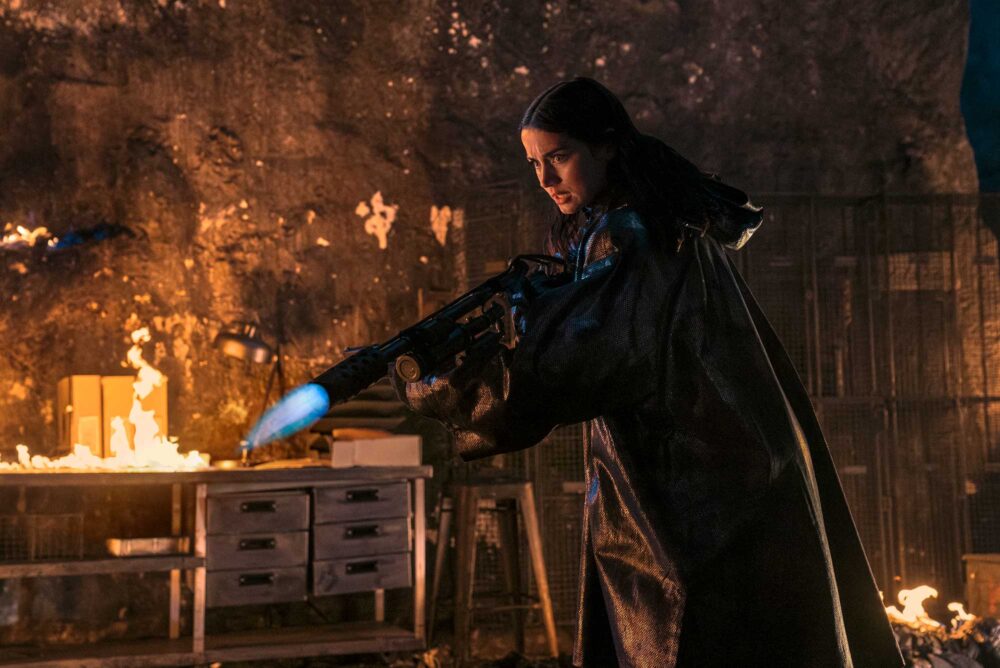
Words by JANE CROWTHER
Photographs courtesy of LIONSGATE
From the World of John Wick: Ballerina is in cinemas now
Words by JANE CROWTHER
Last year Cannes boasted Ozploitation The Surfer starring Nicolas Cage as a wave rider who becomes unhinged when tested by locals at an Australian surf spot. This year, the festival saw Jai Courtney get his crazy on in a similarly willfully silly but entertaining horror-actioner that features surfers in the land down under.
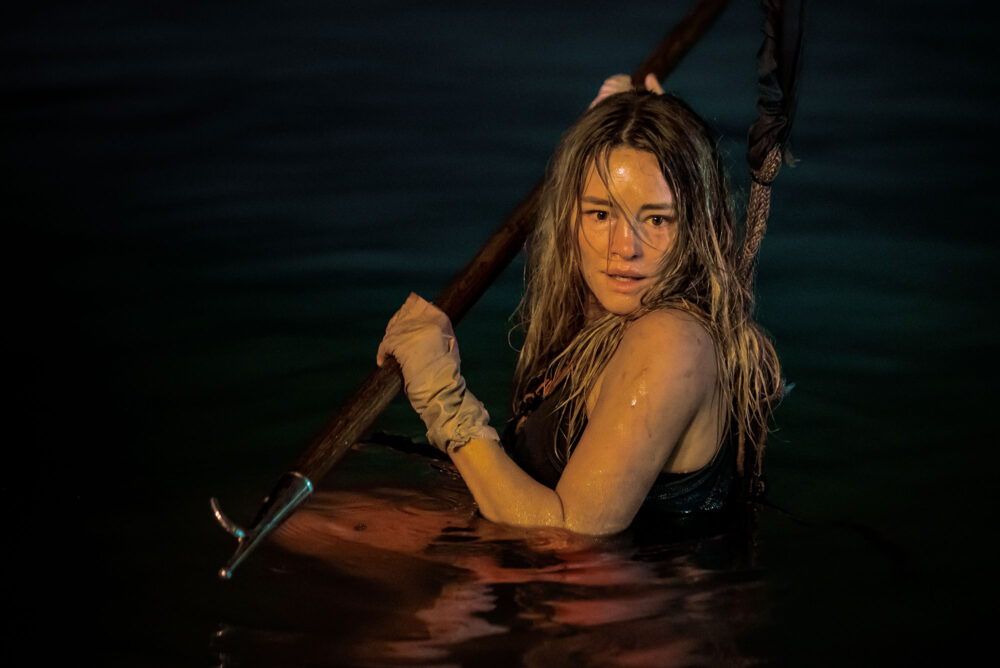
Premiering in Directors’ Fortnight, Sean Byrne’s video nasty stars Courtney as a salty seadog, Tucker, who trawls for female victims, not just fish, and gets off on feeding them to sharks while taping them with a camcorder. ‘So no-one knows you’re here?’ he asks a dopey backpacking couple who arrive at his Gold Coast boat looking for a day trip, and within ten minutes we’re treated to his bloody MO. Cut to feisty surfer Zephyr (Hassie Harrison) who meets-cute with a local, Moses (Josh Heuston) before taking off for some dawn tubes and falling victim to Tucker’s abduction techniques. Will the surfer outsmart the psychopath aboard his rusting ship before the great whites circle for dinner time?
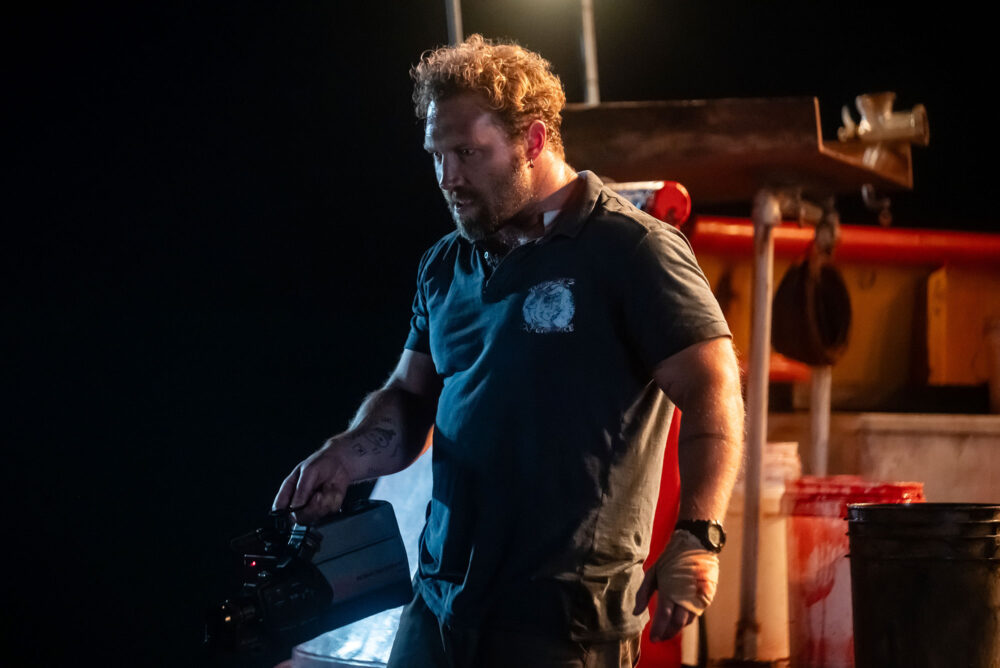
Courtney is clearly having great fun as a leering shark enthusiast with Mummy issues and an inexhaustible line of fishy analogies in a grindhouse-style film that has little truck with logic and a squeamish moment involving a thumb and a pair of handcuffs. Harrison makes good work of fighting for survival while maintaining perfect hair and the CG sharks chew on people inconsistently (yes to one struggling, splashing girl; no to another swimming, splashing girl).
It’s not designed to test the brain or bum, but if you like a brisk, nasty little horror that understands its genre and purpose, Dangerous Animals is decent bait.
Words by JANE CROWTHER
Photographs courtesy of VIRTIGO RELEASING
Dangerous Animals premiered at the 78th Cannes Film Festival and is in cinemas now